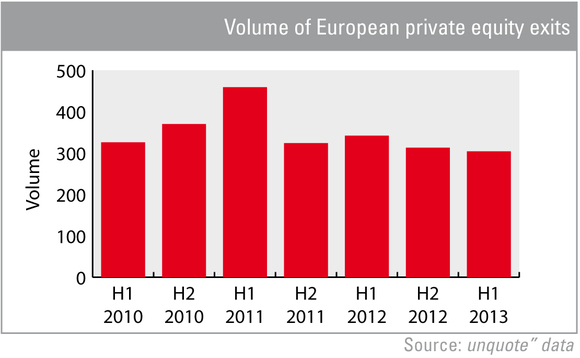
Exit activity remains low despite headline deals

Although divestments have featured prominently in the news recently, figures seem to tell a different story. Alice Murray takes a look at this year's exit landscape
A recent run on IPOs, trade sales and the ever-present secondary buyout says exit season is in full swing. However, the figures tell a different story with the value and volume of divestments far below levels seen in the last three years.
According to unquote" data, the number of exits recorded in the first seven months of 2013 is down on previous years. Post crisis, 2011 was a stellar year for divestments with 787 companies sold reaching a total of €103bn across all of Europe. However, from January to July this year there has been just 342 disposals, making a monthly average of around 48 deals – if this is used to predict full-year activity, the expected total comes in at a depressing 586.
And for those optimists who believe exit numbers could pick up in the latter half of the year, a quick glance at the monthly breakdown of exit activity in recent years shows that August to November are traditionally quiet months. In fact, comparing first to second halves exemplifies the slowdown. In the busy year that was 2011, 459 exits were completed in the first half and only 324 in the second. Again, in 2012 there were 340 divestments in the first six months of the year and just 313 in the following months, according to unquote" data.
These figures are surprising as it feels as though 2013 has been rife with disposals. In reality the data shows exit activity is relatively poor. But, divestments are certainly receiving more attention this year because they are yielding sizable returns, reopening routes once believed to be closed and taking place in neglected geographies.
Exit left-field
Bahrain-based Investcorp pulled out a mighty 8x return on its sale of payments provider Skrill to CVC for a hefty €600m earlier in August. The deal is exciting because in all probability it is one of the most profitable exits to benefit a Middle Eastern player (unfortunately there is little data available on this region to prove this) and it highlights the growing necessity of global payment solutions.
The less high-profile turnaround house Alchemy Partners was an unexpected attendee of this month's exit party, selling its majority stake in Lloyd's of London underwriter Cathedral Capital for £266m, generating a 2.5x return.
Even the eerily quiet Spanish market has been making noise with CVC's sale of professional salon products business The Colomer Group to Revlon after a lengthy 13-year holding period and a two-year sales process.
Proving optimistically overpriced deals can be done was Langholm Capital's divestment of crisp maker Tyrrells for £100m to Investcorp. Langholm's plans to sell the business were widely publicised back in May, with many commentators believing the price tag to be over-ambitious. Thanks to the growing importance of snacks in the Middle East, Bahrain-based Investcorp coughed up the full asking price.
Exit routes leading to the Gulf are racking up good mileage with RCapital's sale of Little Chef to Kuwait-based Kout Food Group. When it initiated the sale process for the roadside eatery, RCapital expected the 55-year-old chain to be rebranded by its new owners, with Costa Coffee, McDonalds and KFC expressing interest. But in a surprising turn of events Kout, which also operates franchises for Burger King, Pizza Hut and Taco Bell in Kuwait, has said that it will hold on to the brand name following a revitalisation process.
ECI Partners' decision to list value alcohol retailer Bargain Booze managed to catch a few market observers off-guard. In the UK there have been just 12 IPOs of general retail businesses since 1996, according to unquote" data, including ECI's most recent addition. Prior to this, the last IPO from the sector was in 2010 with Promethean's flotation of Cambria Automobiles. On top of breaking the retail IPO drought, ECI's team members have undoubtedly been popping the cheap champagne corks thanks to the listing's 4.5x return.
Looking back over the course of this year highlights even more standout divestments with Doughty Hanson's sale of Vue, which saw the GP doubling its money after just three years. Synova Capital scored its debut exit with its sale of DBG to Carlyle and Palamon Capital Partners, bringing home an impressive 5.8x return. Meanwhile, Penta Capital's listing of esure generated a healthy 3.3x money multiple.
Despite subdued 2013 activity, next year looks set to be an excellent vintage for exits. The CBI's most recent forecast was encouragingly optimistic on corporate investment, providing a key exit route for those looking to dispose of assets. The report forecasts business investment to grow by 7.3% in 2014 from a depressing -2.8% this year.
On top of strengthening IPO activity and the prospect of corporates finally putting cash to work, secondary buyouts are likely to continue dominating the exit market. The asset class is still sitting on unprecedented levels of dry powder and is under more pressure to put money to work. At least GPs will have plenty to look at as, according to unquote" data, 44% of all European buyouts completed in 2006 are still in fund portfolios, while 57% of investments done in 2007 are yet to be realised.
Latest News
Stonehage Fleming raises USD 130m for largest fund to date, eyes 2024 programme
Sponsor acquired the public software group in July 2017 via the same-year vintage Partners Group Global Value 2017
Stonehage Fleming raises USD 130m for largest fund to date, eyes 2024 programme
Czech Republic-headquartered family office is targeting DACH and CEE region deals
Stonehage Fleming raises USD 130m for largest fund to date, eyes 2024 programme
Ex-Rocket Internet leader Bettina Curtze joins Swiss VC firm as partner and CFO
Stonehage Fleming raises USD 130m for largest fund to date, eyes 2024 programme
Estonia-registered VC could bolster LP base with fresh capital from funds-of-funds or pension funds









